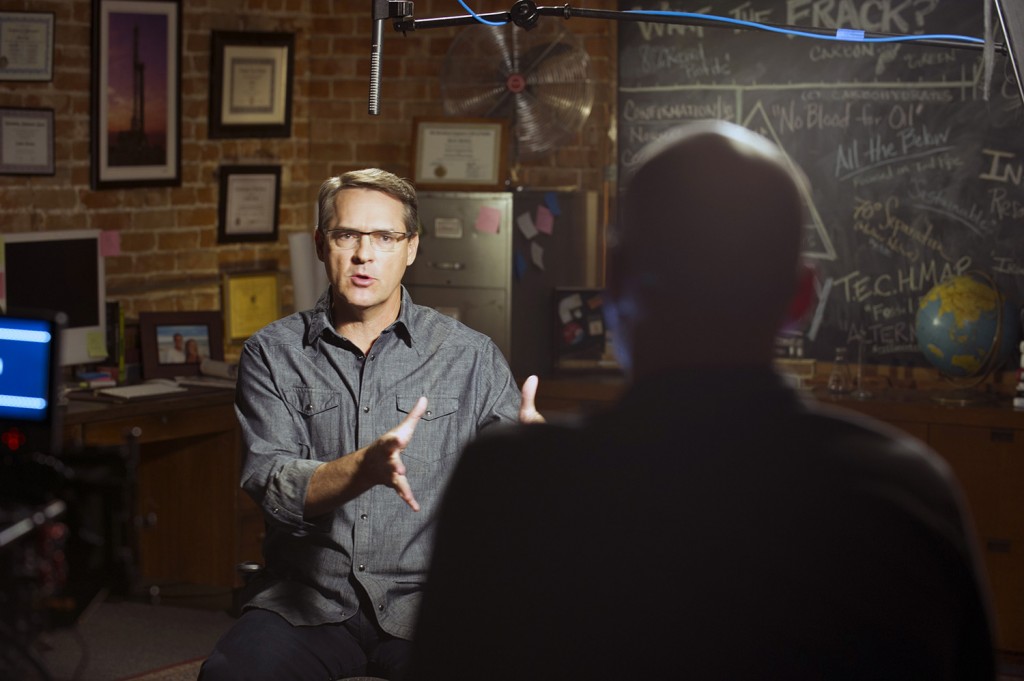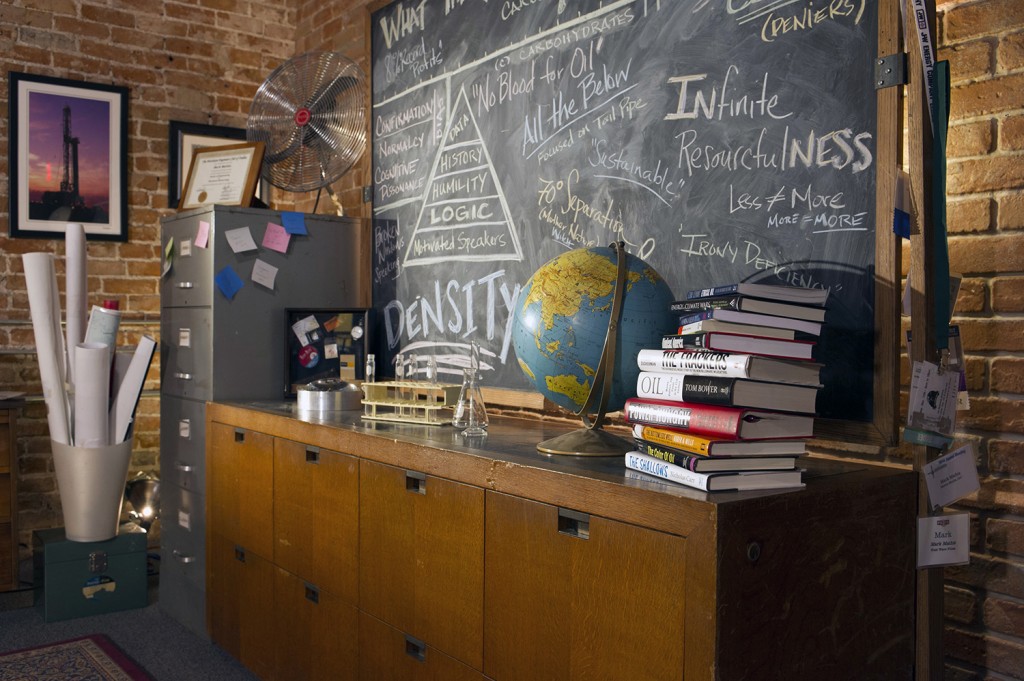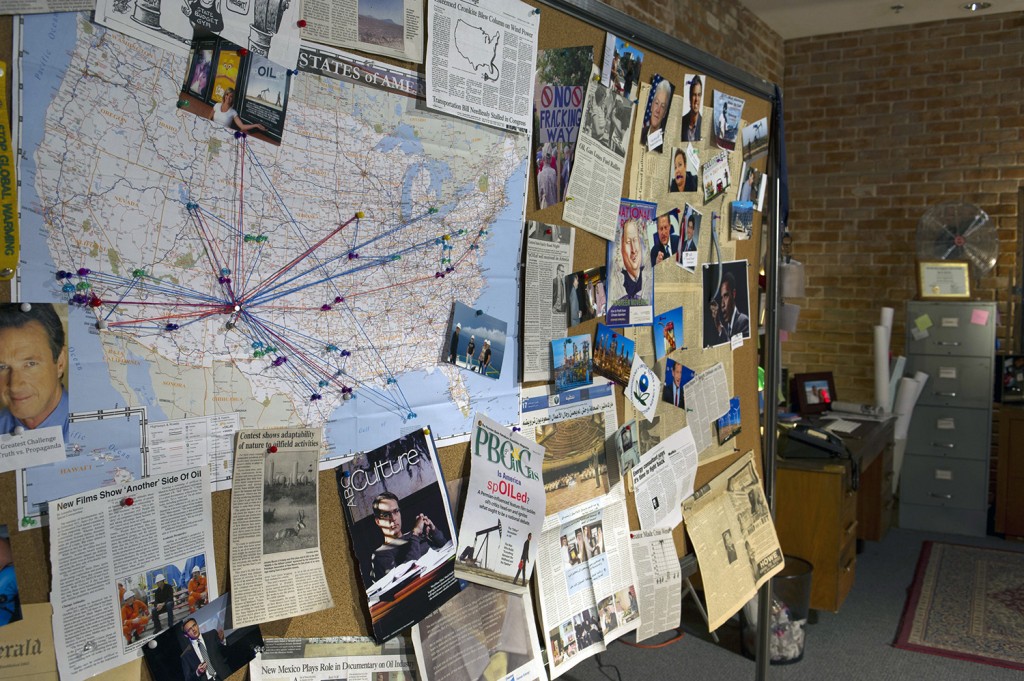In his new film, Fractured, filmmaker Mark Mathis compels us to watch our mouths when we talk about the energy industry.
by Tony Burke
“Something we shot [for Fractured] but didn’t use because we didn’t have time for it is: you could take every guy like me, I’m a professional talker, I’m a doer too, but the foundation of what I’m doing is talking,” said Mark Mathis. “Take 10,000 guys like me; throw us in the ocean. We’re gone. The world would not change a single bit. The world would just keep on moving. If you take 10,000 key ‘doers’ in the energy industry and throw them in the ocean, you could cripple a nation. These are the most important people alive. The talkers, they really don’t matter much at all.”
Filmmaker and media veteran Mark Mathis, by his own admission, is a talker. On the distinction, Mathis added, “The anti energy racket is full of talkers who have never produced anything. The energy industry is [there] to produce all these things that make our lives better. The ‘antis’ are only there to attack the industry. It’s not a fair fight. I’ve always had an admiration for doers and hard workers, and contempt for the talkers. I want to explain what is real, and that shines a light on what these people do.”
The man knows how to set a tone. So, what is Fractured actually about? Fractured is a 92-minute trip to the woodshed for many of terms we connonly use when discussing oil and gas. “Fossil fuels,” “clean energy,” “finite resource,” “fracking,” and other phrases are all put under the microscope.
In Permian Basin Oil & Gas, “frack” isn’t even supposed be printed with a “k” on the end. The men and women of oil and gas are sensitive to that sort of thing, and only like to refer to the practice as hydraulic fracturing or frac’ing. This is precisely the battle that Fractured wants to take up.
“I like that you guys do that,” Mathis told me. “It sets up the question. Where’s the K? Industry people, they know what that means. For anybody else, they will ask about it and now you’ve got an anchor point for the discussion. That’s what Fractured does. What I do in Fractured, and what I want tens, or hundreds of thousands, of people to do, is use the terms I laid out in the film and start these conversations. There needs to be a fight every once in a while.”
As an independent documentary, Fractured has a long, arduous road ahead just to get in front of audiences. Touring, securing venues, and sitting for Q&As are all part of the “four-walling” grind. Mathis and his producing partner Kevin Miller went through it with their 2011 collaboration, spOILed, and the anticipation of going through it again factored into opting for a stripped-down Errol Morris-style documentary with Fractured. Mathis is currently seeking supporters through an Indiegogo.com campaign. The 45-day campaign began on Feb. 25. To view the campaign, support the film, and find out how you can see it, visit FracturedTheMovie.com.
“What every filmmaker wants is for their movie to be released theatrically. We don’t have the budget of an Al Gore, we don’t have a studio behind us, but we would like this to become a conversation changer,” said Kevin Miller, co-writer and editor of Fractured.
Miller, who can be heard in Fractured, prompting Mathis from off-camera, is a veteran of the documentary format. Fractured is the seventh feature-length doc he’s been involved with in a variety of roles, including those of writer, director, and producer.
“A documentary is an opportunity to engage with controversial issues,” said Miller. “It’s an opportunity to go really in-depth into a topic that people don’t normally take the time to read about themselves. You can really get a lot of information across.”
Fractured most certainly conveys a lot of information. The fast-paced feature consists of short segments, each one parsing a different disparaging phrase used in energy conversation. The segments are supplemented and chained together by brief media and movie clips to allow viewers just a moment of digestion before moving on.
Central to the filmmakers’ intentions is their effort aimed not only at rebuking the negative language, but offering an uncommonly optimistic perspective about the realities of the world’s energy situation.
“Energy is not the problem, it’s the solution. Energy is the solution we use to solve all of our issues. The key is to continue finding better, smarter ways,” said Miller. “What we want to get behind is that human innovation is an unlimited resource. When you back us into a corner, we will innovate our way out of it.”
“Human history has always been about finding new sources of energy. Once we arrived at fossil fuels, we realized that was the most efficient and beneficial,” he added. “I think that’s one of the most difficult ideas to accept in [Fractured], that our best option is fossil fuels.”
While fair treatment of the energy industry, particularly oil and gas companies, is close to the heart of Mark Mathis, the near-ten-year veteran of televised news cherishes his artistic independence, and the right to speak his mind.
“When I wrote my book, that was great training. I have been an independent producer of information for 22 years. I like it that way, because I like having an independent voice. I want to break things down, analyze, and then present. I don’t have to worry about saying something that someone isn’t going to like,” he said.
“Here’s what is. Deal with it,” said Mathis, “The key is to present information fairly.”
“Not only is what’s being said [about oil and gas] wrong, it’s dangerous. [Those attacking the industry] are selling fantasy. It needs to be exposed,” he added.
“You’re really naive if you think that people are investing hundreds of millions of dollars in environmental campaigns and not expecting any returns,” said Kevin Miller, “Look at Al Gore… There’s nothing wrong with making some money but you have to look at how that’s affecting the method of delivering the message.”
Needless to say, both the message and the motivation of today’s environmental lobby are called into question by Fractured.
The narrative Mathis and Miller seek to uncover is that advancement of energy use has changed life on earth for the drastically better. According to Mathis we should look at human history in terms of what energy was used rather than what tools were used (think Stone, Bronze, and Iron ages). According to Fractured, prior to industrialization, humans lived in the “Carbohydrate Age,” a term that summons the gritty reality that physical labor and manpower represented the only energy resources we had. Spring forward to our present “Hydrocarbon Age,” and a pattern emerges: longer lifespans, less disease, higher quality of life, etc.
If “clean energy” and “gasoline” seem mutually exclusive, then Fractured would like you consider that the lowest energy-consuming nations in the world are also the least developed, and that those living in these nations lead the shortest, dirtiest existences on the planet.
“We tend to be very emotional about things related to environmentalism,” said Miller, “When someone comes along and challenges the way we think about it, our first reaction is usually to get angry.”
“This term that I don’t like, ‘fossil fuels.’ Should we get off these? ‘Of course!’ But why?” asked Mathis. “Not only is this not dirty, it’s the cleanest thing that has ever happened to humanity.”
According to Fractured, life before hydrocarbon use was poor, nasty, brutish, and short. Thomas Hobbes could commiserate.
Fractured also explains why supposed alternatives such as wind and solar power are supplemental sources at best. The production shortfalls of these sources preclude them from becoming viable replacements for oil, etc., and we can’t simply stop what we’re doing to wait for them to catch up. The realities presented in Fractured are that developing nations can’t be asked to stop developing (nor should they be), and the people of the industrialized world can’t be asked to use less energy. Well, maybe they can be asked… in fact, do we have any volunteers?
“[T]here are the people in the middle, that find themselves saying things that are untrue, not because they want to be ignorant, but because they just don’t know,” said Mathis. “When you have politicians and celebrities putting out misinformation… What are they to think? The loudest voices are saying these untrue things, so why wouldn’t they believe it?”
“We are trying to counter the doom and gloom, and the pessimism that comes from the environmental lobby,” said Miller.
Recalling a crystallizing moment, Mathis proffered, “I gave a speech back in 2003, when my book had come out. I gave this speech and then had to quickly fly to Kansas City for a conference with United States attorneys about gun violence. The [speech was for] independent oilmen. There was really no security there. If something were to happen and you were to lose these people, this nation would be shaken. There was a lot of intellectual capital in that room that would have been lost. Then I went to this event with all these attorneys. There was security everywhere.”
Tony Burke is the assistant editor of PBOG. He blogs about film at planetburke.com and his Twitter account (also largely on film) is @anthjburke. He can be reached at tburke@zacpubs.com.












